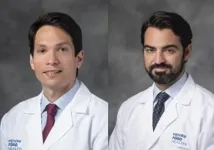(Press-News.org) For nearly 20 years, Stephen Ball has been a man on a mission: helping older Missourians stay healthy and get stronger through physical activity.
In 2005, the professor in the University of Missouri College of Health Sciences helped created a program called Stay Strong Stay Healthy (SSSH). Since then, the eight-week strength training program has helped more than 20,000 older adults across five states. Participants aged 60 and up are taught how to safely complete exercises — including squats, bicep curls and lunges — in a comfortable, friendly environment.
“One thing I always preach when it comes to physical activity is: some is better than none, more is better than some, and too much is difficult to get,” Ball said. “As the United States population is aging, I want to make a difference by helping older adults stay independent as they age and send the message that you don’t need an expensive gym membership with a personal trainer to stay active. We created a community-based program so older adults can exercise with others who look like them in a more comfortable, social environment.”
The MU Extension program has proven results. Participants consistently report an increase in physical energy and self-confidence, and multiple peer-reviewed studies and an extensive body of published literature show the program improves muscle strength, balance, flexibility and sleep. It’s also been proven to reduce participants’ risk for falling, a big concern for aging adults.
“Another benefit we often hear about is the social enjoyment participants have spending time with other older adults,” Ball said. “While it is certainly not expected, participants sometimes take the instructors out for lunch or ice cream after class as a sign of gratitude, appreciation and friendship.”
If some is good, more is better
The SSSH program begins with an introductory eight-week Level 1 class before participants can graduate to a more challenging eight-week Level 2 class. A recent study analyzed the effectiveness of the Level 2 class for more than 400 participants who completed the class in 78 counties throughout Missouri and Kansas over a three-year period. The findings showed that participants not only maintain the health benefits from Level 1 but also see additional improvement during Level 2.
“It’s gratifying to work with older adults because you really see them improve over time, and they quickly notice all the various health benefits,” Ball said. “As soon as they complete Level 1, they’re often asking how soon they can start Level 2.”
And the participants aren’t the only ones who benefit from the program. In addition to classes being taught by MU faculty, MU undergraduate and graduate students have the opportunity to lead sessions and develop soft skills such as relationship-building, leadership and teaching.
“I learned the importance of making the participants feel comfortable — a skill you can only really learn through experience — and I feel like I learned as much from the participants as they learned from me,” said Audrey Guess, an undergraduate student instructor majoring in health sciences. “I was originally thinking about a career in pediatrics, but now I think I want to continue to help older adults.”
Melaina Files, an undergraduate student instructor majoring in nutrition and exercise physiology, said the experience is one she won’t soon forget. “Becoming an SSSH program instructor was the most rewarding experience of my undergraduate career at MU,” she said. “I was so impressed by how much respect the participants had for us as instructors, and I appreciated hearing all of their life stories and wisdom.”
Building MOmentum
SSSH incorporates MU’s three main missions as a land-grant university: teaching, research and community outreach. In addition to teaching and conducting research at MU, Ball also serves as a state fitness specialist with MU Extension. He and Kelsey Weitzel, an associate extension professor and SSSH program manager, often travel across Missouri to teach MU Extension field faculty how to deliver the SSSH program to older adults in rural areas.
“We partner with research faculty at Oklahoma State University, and their extension network is now delivering SSSH to older adults in Oklahoma as well,” Ball said. “A few years ago, our SSSH program was named as an “evidence-based program” by the federal government’s Supplemental Nutrition Assistance Program (SNAP). This designation allows for the use of federal funds to deliver SSSH to eligible audiences."
Going forward, Ball plans to apply for evidence-based status from the National Council on Aging (NCOA). This designation would open the door for additional funding to deliver SSSH nationally, especially to help older adults reduce their risk of falling so that they can maintain independence as they age.
“We are proud of our impact so far, and we’re just getting started,” Ball said. “Because of the popularity and success of our program, we’re piloting a Level 3 class to help participants continue their forward momentum. Not only are we changing the lives of the participants by improving their health as they age, we are also providing professional development opportunities for our students at MU as well.”
“Improving older adults’ functional health using the progressive Stay Strong, Stay Healthy program” was published in the Journal of Applied Gerontology.
Editor's note:
For older adults interested in enrolling in SSSH, email muextsssh@missouri.edu. More information on SSSH can be found at extension.missouri.edu.
END
Fitness with no age limit
MU’s Stay Strong Stay Healthy program has helped older adults exercise in group settings for decades, and it is just getting started.
2024-01-03
ELSE PRESS RELEASES FROM THIS DATE:
Inflammatory bowel disease varies by race, sex and birthplace, researchers find
2024-01-03
Researchers from Rutgers and other institutions have uncovered significant variations in how inflammatory bowel disease (IBD) affects people of different races, sexes and places of birth.
The study, published in Gastro Hep Advances, may assist caregivers and help shed light on how diet, lifestyle and genetics can affect the development and disease course of IBD, a term for two conditions – Crohn’s disease and ulcerative colitis – that cause chronic inflammation in the gastrointestinal tract.
“IBD has historically been a disease of Caucasian populations in Europe and North America, but now we’re seeing it among all races and in people all over the ...
Study charts possibilities for a better way to diagnose gestational diabetes
2024-01-03
Pregnancy weight and biochemical markers measured in blood from women with gestational diabetes mellitus (GDM) were related to increased risk of poor pregnancy outcomes, suggesting a new direction for precision diagnostics, according to researchers.
The study led by Ellen C. Francis, an assistant professor in the Department of Biostatistics and Epidemiology at Rutgers School of Public Health, and published in Communications Medicine, evaluated the diagnostic value of these markers before or at the time of screening ...
Is radon linked to health condition other than lung cancer?
2024-01-03
MINNEAPOLIS – Radon, a naturally occurring radioactive gas produced when metals like uranium or radium break down in rocks and soil, is a known cause of lung cancer. Now new research has found exposure to high levels of this indoor air pollutant is associated with an increased risk of another condition in middle age to older female participants with ischemic stroke. The study is published in the January 3, 2024, online issue of Neurology®, the medical journal of the American Academy of Neurology. Ischemic ...
Even in midlife, disrupted sleep tied to memory, thinking problems later on
2024-01-03
MINNEAPOLIS – People who have more disrupted sleep in their 30s and 40s may be more likely to have memory and thinking problems a decade later, according to new research published in the January 3, 2024, online issue of Neurology®, the medical journal of the American Academy of Neurology. The study does not prove that sleep quality causes cognitive decline. It only shows an association.
“Given that signs of Alzheimer’s disease start to accumulate in the brain several decades before symptoms begin, understanding the connection ...
Nematode proteins shed light on infertility
2024-01-03
We have two copies of each chromosome in every cell in our bodies except in our reproductive cells. Sperm and egg cells contain a single copy of each chromosome with a unique mix of genes from our parents, an evolutionary trick to give our offspring genetic variability. The sperm and egg are made during meiosis, the process by which cells with two chromosome copies reduce their chromosome numbers to one. For meiosis to work, the two chromosomes must align perfectly and exchange the correct amount of genetic information. Any deviation puts fertility at risk.
Enter the synaptonemal complex (SC), a zipper-like protein structure that lines up and anchors ...
New $5 million NIH grant to study how pregnancy affects children with disabilities
2024-01-03
CHICAGO --- How does a pregnant person’s environment, diet, stress, medications and social wellbeing affect their pregnancy and — down the road — their child’s health?
That will be the focus of a new two-year study from scientists at Northwestern University Feinberg School of Medicine and Ann & Robert H. Lurie Children’s Hospital of Chicago, which will examine how environmental factors affect children, including those with a variety of disabilities.
The scientists recently were awarded $5 million from the National Institutes of Health (NIH) to join a national consortium — theEnvironmental ...
Jack D. Buckley, MD, MPH, FCCP, becomes the 86th President of the American College of Chest Physicians
2024-01-03
Glenview, IL– Effective January 1, Jack D. Buckley, MD, MPH, FCCP, is the new President of the American College of Chest Physicians® (CHEST). John Howington, MD, MBA, FCCP, steps into the role of President-Elect, Neil S. Freedman, MD, FCCP, is the new President-Designate and Doreen Addrizzo-Harris, MD, FCCP, completes her term as President to become Immediate Past President of CHEST.
Jack D. Buckley, MD, MPH, FCCP, is a pulmonologist and critical care physician with an extensive background in education. Dr. Buckley is a Professor of Medical Education at Western Michigan University Homer Stryker MD School of Medicine. ...
Mass General scientists help to solve the mystery of how a rare congenital scalp defect forms
2024-01-03
Key Takeaways
Researchers have revealed the mechanisms behind mutations that cause a congenital condition called aplasia cutis congenita, in which babies are born without skin along the midline of the scalp
The mutations lead to the impairment of cells that normally express growth factors that induce skin formation over the skull
BOSTON – Children with the condition aplasia cutis congenita (ACC) are born with the absence of skin along the midline of the scalp. Depending on whether mutations are in the KCTD1 or KCTD15 genes, additional characteristics beyond the scalp—such as kidney or heart problems—are also present.
When investigators led by a team ...
Henry Ford Health cardiologists publish case series study on heart valve procedure
2024-01-03
DETROIT (January 3, 2024) – Findings from a published case series research letter by the Henry Ford Health Structural Heart Disease team show that severe mitral stenosis, due to a build-up of calcium deposits in the mitral valve common in elderly patients, can be safely and successfully treated using Intravascular lithotripsy (IVL)-enabled percutaneous balloon mitral valvuloplasty. However, larger prospective studies in high-risk population are needed to confirm the findings.
These key takeaways from the research letter on IVL-facilitated valvuloplasty for severely calcified mitral valve stenosis are published ...
Therapeutically harnessing cancer stem cell-derived exosomes
2024-01-03
“[...] recent significant advances in understanding [...] CSC-Exos have revealed numerous potential applications for diagnosis and treatment.”
BUFFALO, NY- January 3, 2024 – A new editorial paper was published in Oncotarget's Volume 14 on December 20, 2023, entitled, “Therapeutically harnessing cancer stem cell-derived exosomes.”
In this editorial, researcher Yong Teng from Emory University discusses cancer stem cell-derived exosomes. Cancer stem cells (CSCs), a small population of cancer cells capable of self-renewal, are thought to serve ...
LAST 30 PRESS RELEASES:
$3 million NIH grant funds national study of Medicare Advantage’s benefit expansion into social supports
Amplified Sciences achieves CAP accreditation for cutting-edge diagnostic lab
Fred Hutch announces 12 recipients of the annual Harold M. Weintraub Graduate Student Award
Native forest litter helps rebuild soil life in post-mining landscapes
Mountain soils in arid regions may emit more greenhouse gas as climate shifts, new study finds
Pairing biochar with other soil amendments could unlock stronger gains in soil health
Why do we get a skip in our step when we’re happy? Thank dopamine
UC Irvine scientists uncover cellular mechanism behind muscle repair
Platform to map living brain noninvasively takes next big step
Stress-testing the Cascadia Subduction Zone reveals variability that could impact how earthquakes spread
We may be underestimating the true carbon cost of northern wildfires
Blood test predicts which bladder cancer patients may safely skip surgery
Kennesaw State's Vijay Anand honored as National Academy of Inventors Senior Member
Recovery from whaling reveals the role of age in Humpback reproduction
Can the canny tick help prevent disease like MS and cancer?
Newcomer children show lower rates of emergency department use for non‑urgent conditions, study finds
Cognitive and neuropsychiatric function in former American football players
From trash to climate tech: rubber gloves find new life as carbon capturers materials
A step towards needed treatments for hantaviruses in new molecular map
Boys are more motivated, while girls are more compassionate?
Study identifies opposing roles for IL6 and IL6R in long-term mortality
AI accurately spots medical disorder from privacy-conscious hand images
Transient Pauli blocking for broadband ultrafast optical switching
Political polarization can spur CO2 emissions, stymie climate action
Researchers develop new strategy for improving inverted perovskite solar cells
Yes! The role of YAP and CTGF as potential therapeutic targets for preventing severe liver disease
Pancreatic cancer may begin hiding from the immune system earlier than we thought
Robotic wing inspired by nature delivers leap in underwater stability
A clinical reveals that aniridia causes a progressive loss of corneal sensitivity
Fossil amber reveals the secret lives of Cretaceous ants
[Press-News.org] Fitness with no age limitMU’s Stay Strong Stay Healthy program has helped older adults exercise in group settings for decades, and it is just getting started.



